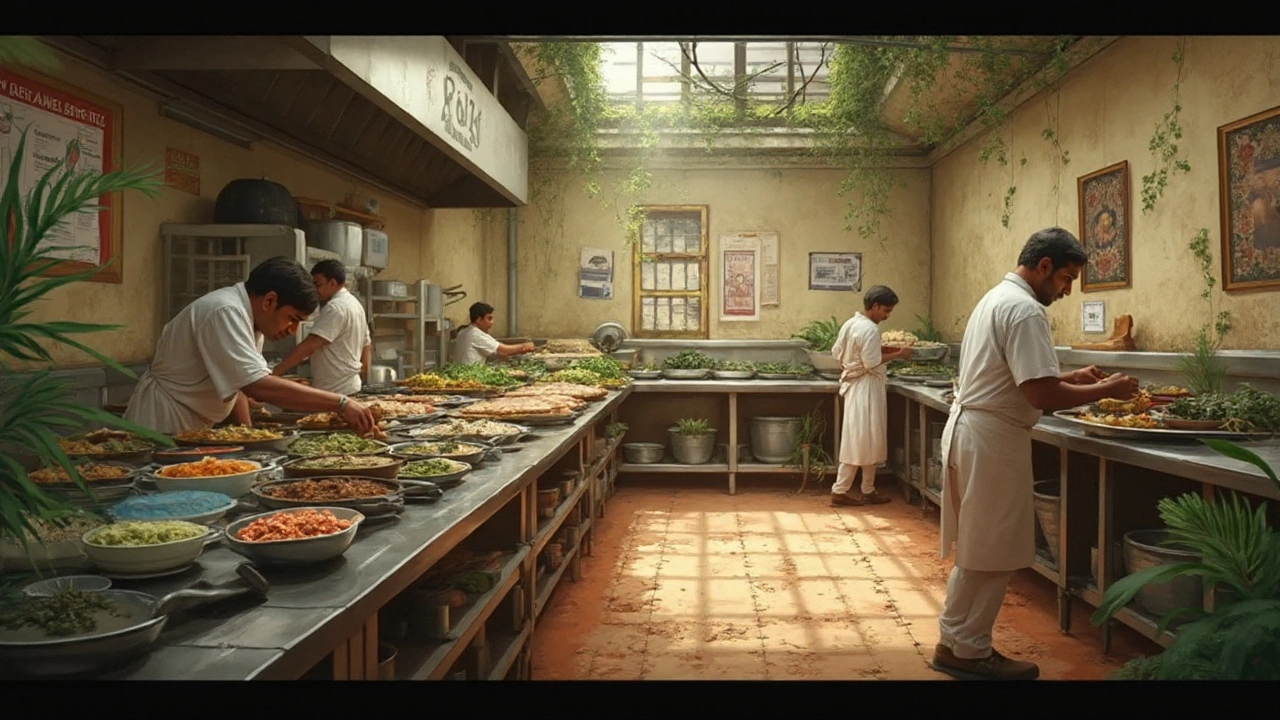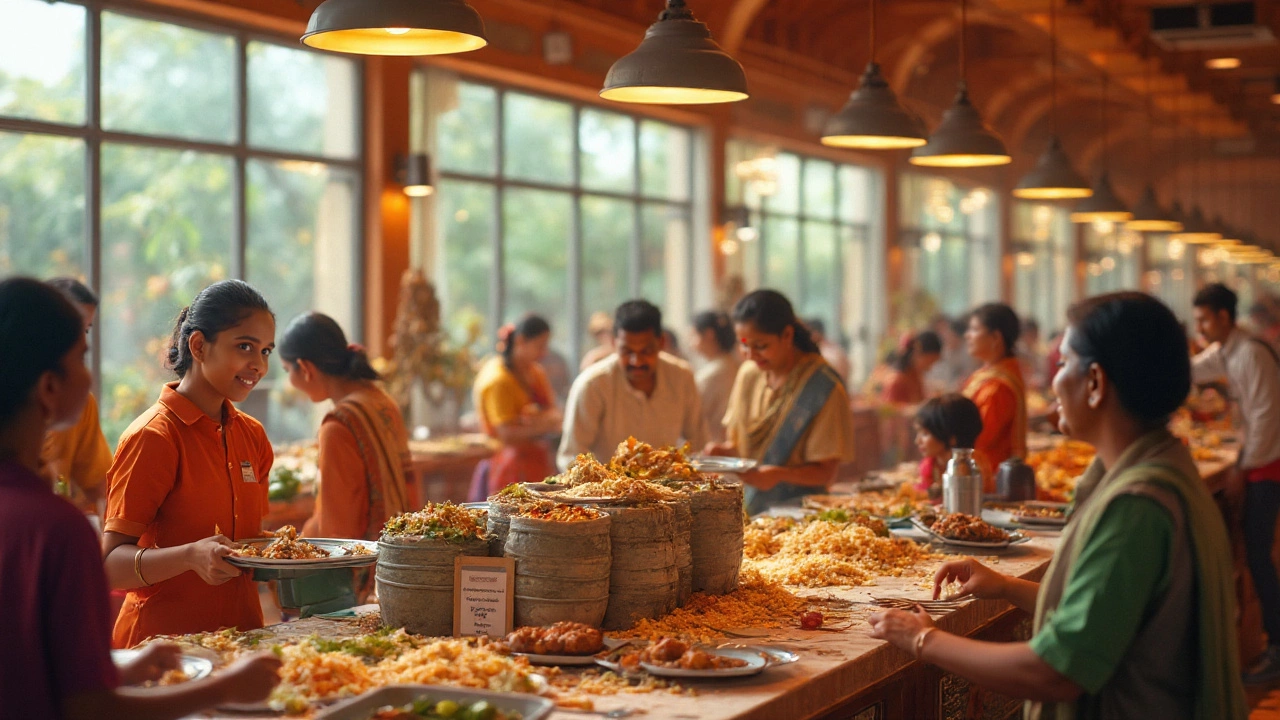Hundreds of croissants, unclaimed trays of bacon, and a ridiculous mountain of yesterday’s lasagna—it’s not some fever dream from a kitchen nightmare. This kind of waste is what you actually see every single day in just about any all-inclusive hotel buffet. So, what happens to all that leftover food when the last plate is cleared and the lights go out in the dining room?
Most guests never think about this. It disappears before breakfast is even over, vanishing as efficiently as the sunrise after a late-night poolside cocktail. But there’s a whole ecosystem behind the curtain, managing mountains of food that just didn’t make it onto someone’s plate. The truth isn’t as glamorous as the breakfast spread, but it’s way more interesting.
The Daily Life Cycle of Hotel Leftovers
Start the day in an all-inclusive hotel and you’ll find kitchens working like a small army. Chefs and staff prep rolls, eggs, bacon, fruits, and pastries by the truckload, operating on estimates, past data, and pure gut instinct. But let’s be honest: nobody ever nails it 100%. That ‘just in case’ attitude creates surplus. Then, more surprises hit. Maybe fewer guests show up because of bad weather or there’s a shift in food trends (everyone suddenly wants oat milk and the regular milk jugs get left untouched). Leftovers are inevitable in this balancing act.
So, here’s the play-by-play: At the end of service, uneaten food from public display, like buffets, can’t legally be reused for guests due to strict health codes in most countries. Hot food that’s been kept at safe temperatures is sometimes kept back for staff meals, if policy allows. Cold items, especially things like pre-cut fruits or dairy, often get binned–they just don’t hold up.
There’s a wrinkle though—private functions. For banquets or large catered events, untouched food (not placed out for self-service) might be refrigerated and served later, donated, or sent to staff canteens. But with buffet food, once it’s hit the public trays, it’s seen as ‘contaminated’ and legally hotels can’t serve it again, even if it looks perfect.
| Hotel Food Fate | Legality/Typical Practice |
|---|---|
| Buffet Trays (hot/cold) | Usually discarded if publically displayed |
| Untouched Banquet Food | Can be repurposed, donated, or used for staff |
| Prepped, Unserved Items | Refrigerated/reused within health rules |
| Staff Canteens | Accept surplus only if safe & within rules |
This is why some hotel operators get creative with planning, doing regular “waste audits” to tweak how much they cook and serve. For example, Hilton Hotels run programs in several countries that use daily weigh-ins to adapt portion sizes and menus, cutting buffet waste by up to 50% in some properties by 2023. It’s like running a daily experiment—what leftovers tell you changes the next day’s menu, and clever hotels are always fine-tuning.
One less glamorous solution: hotels pay waste management companies to cart off food waste, which is heavy and expensive to shift, especially with landfill charges rising in Europe. That’s why there’s real money on the line here—food waste directly affects profit.
Some hotels in the Mediterranean have started composting schemes, turning food scraps into fertilizer for hotel gardens. A few even work with companies like Winnow or Leanpath that install “smart bins” to digitally track what’s thrown out—chefs get a real-time alert when they’re overproducing, so they course-correct before dinner, saving money and food.
Staff meals are a bit of a bright spot. In certain hotels, leftover chicken or pasta from private events might be safely reused in the canteen. But health codes still rule all: if a tray has been out under sneeze guards, that’s usually the end of its journey. ‘Better safe than sorry’ dominates the food safety mindset.

The Global Push for Sustainability: Cutting Waste and Feeding People
This isn’t just about hotels taking a hit on their margins. Food waste is a brutal statistic—globally, the UN estimates a full 931 million tonnes gets dumped each year, with big hotels and resorts a hefty contributor. You can’t talk about all-inclusive hotels without facing this elephant in the dining room.
Some properties are bucking the old ways by joining nonprofit partnerships. For instance, hotels across Spain, France, and Portugal have started working with apps like Olio or Too Good To Go, letting locals and tourists buy day-old meals or snack packs dirt cheap. That means what would go in the bin ends up as a late-night treat for someone, keeping more food in bellies and less in dumps. Even the Ritz in Paris signed on, packaging untouched pastries for charity pickup daily.
Then you get stories like Sandals Resorts in the Caribbean, which have a rule—absolutely nothing edible goes to landfill. The leftover food is sorted: what’s safe gets rerouted to local animal farms, creating a bizarre but practical food chain. Unsalvageable scraps get composted for resort landscaping. It’s not perfect (you can’t send every croissant to a pig), but it’s worlds better than waste in the bin.
Some hotels have taken up the “ugly produce” cause too—using surplus or odd-looking veggies in soups and stews, rather than tossing perfectly edible (if oddball) carrots and spuds. Reducing food waste is trendy, but here it actually makes a dent. According to the World Wildlife Fund, hotels that repurpose and donate food have cut disposal costs and improved local relationships, showing you don’t need a Michelin star to make a difference.
Sometimes it comes down to individual staff—a kitchen manager who tweaks prep for quieter weeks, or a breakfast chef who plans smaller batches and refreshes dishes more often. Small adjustments can lead to bin loads less garbage. A study across hotels in Thailand found that adjusting buffet restocking frequency alone cut food waste by 22% in a pilot year. Less food cooked in advance, more cooked fresh as needed—it sounds minor, but across a chain, this adds up to literal tons.
“When hotels get smarter with their food, everyone benefits. Buffet leftovers don’t have to be a problem—they’re an opportunity,” says chef and sustainability advocate Massimo Bottura, whose non-profits have helped launch food donation programs in luxury hotels across Europe.
Why toss it when it can feed someone else or fertilize the gardens? That’s the golden question hotels are finally asking—and answering, with real action.

Practical Tips: How Guests Can Help Reduce Buffet Waste
If you’re the guest, it’s easy to feel all this is out of your hands. But actually, what you do on holiday makes a difference. The secret weapon? Your plate. Ever filled a plate high with everything from the buffet and then found out you only ever wanted two bites of that dessert? You’re not alone—guest behavior is the engine behind a big chunk of hotel food waste.
Here’s where you can make a real impact:
- Take less, come back for more. All-inclusives don’t run out—so don’t treat your plate like it’s the last supper. Make smaller passes at the buffet, then top up if you’re genuinely hungry. This simple move, made by thousands of guests, drops food waste without making anyone feel denied.
- Try what you want, but don’t pile high. Test-sized samples let you taste without tossing.
- Ask about portion sizes. Special orders (like omelets or steak cooked to order) come with adjustable portions—if you’re not starving, ask for a half-size. Hotels usually appreciate it, even if they rarely advertise the option.
- If you have dietary needs or allergies, speak up before service. Hotels often prep less of specialty foods if they know the numbers in advance, preventing big batches from going to waste.
- If you spot an initiative (bins for compost, food donation partnerships), use them and tell management you support them. Positive guest feedback helps these projects keep their funding and get rolled out more widely.
It’s worth knowing your hotel might brag about being green but not tell you the details. Ask questions. Is leftover food composted? Are any local charities or food banks involved? Sometimes just asking is enough to make management reconsider how visible their actions are, and it signals these issues matter to guests.
The solution isn’t just up to hotels. It’s all of us—guests, staff, and the businesses behind the buffets—relearning to respect food, even when it feels unlimited. The next time you’re staring down a tower of pastries on holiday, remember: every plate you don’t overfill is one step closer to tackling buffet waste for good.
